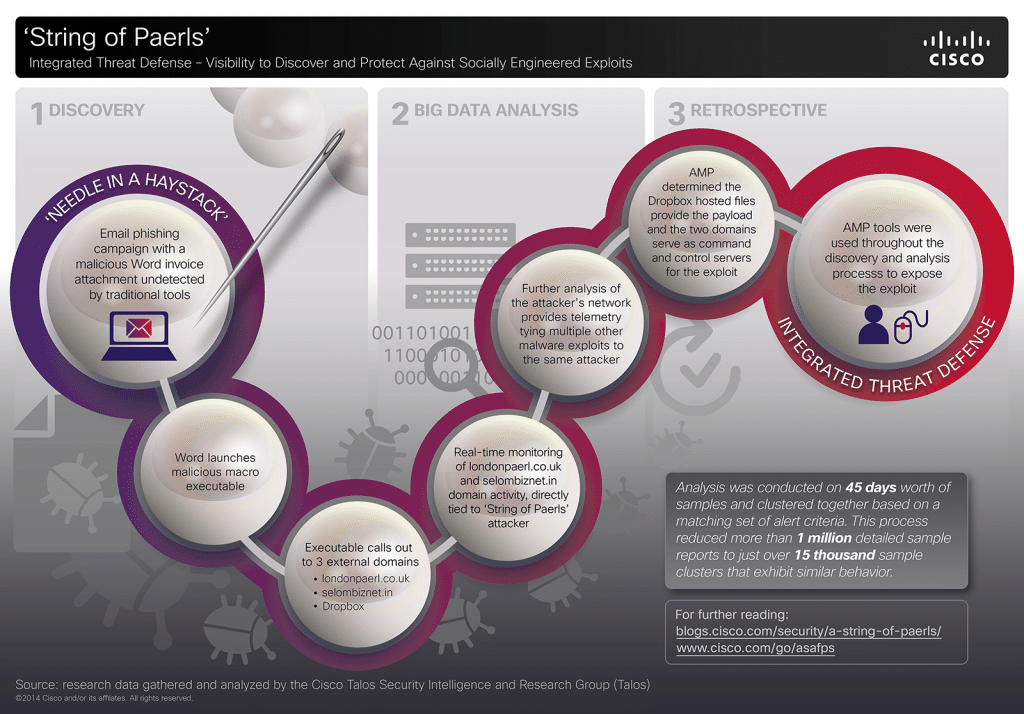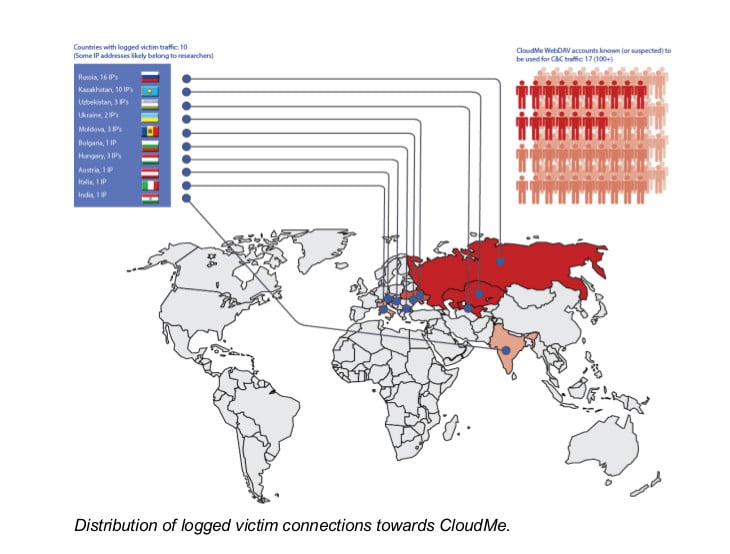In the last year, the world’s attention has been riveted by a series of high-profile hacks of major corporations in retail, finance and the entertainment industry, among others. Each of these incidents is unique, involving different threat actors and motives. However, each of these attacks is also a sterling example of what we, at Cisco, term “multi-vector attack” that employs a range of technologies, deployed in numerous stages, to penetrate the defenses of the target organization. Here at Cisco, we have studied these attacks in-depth and have identified some commonalities among these multi-vector attack, and useful approaches to combat them. This blog post will discuss some of our findings. About Multi-Vector Attacks Any cyber attack, large or small is born from a weak link in the security chain. These weak links take many forms: poorly configured Web servers, gullible employees or vulnerable-but-common applications like Microsoft Office, Adobe Reader and Java are common examples. Multi-vector attacks […]
Trojan
Research Exposes Attacks on Military, Diplomats, Executives
Researchers from Blue Coat Systems said on Wednesday that they have identified an online attack framework that is being used in highly targeted attacks on executives in industries like oil, finance and engineering as well as military officers, diplomats and government officials. The attacks are designed to steal sensitive information and Blue Coat, in a report, said that the attackers went to extreme lengths to cover their tracks: routing all communications between the hackers and the compromised systems they controlled through a “convoluted network of router proxies and rented hosts” in countries like South Korea. The framework, dubbed “Inception” is global in scope, but appears to have started out targeting individuals in Russia. Attacks spread via phishing e-mail messages that contained malicious attachments, including key logging tools and remote access Trojan horse programs, BlueCoat said. The company has released a full report on the incident, which can be found here. (PDF) [Read more Security Ledger coverage […]
Clues Point to Long-Duration Hack at Sony
With each passing day, evidence mounts that the attack on Sony Pictures Entertainment was a long-duration hacking event that gave malicious actors extensive access to the company’s network and data. The hack started out looking like a particularly nasty example of hacktivism – with thousands of SPE systems wiped of all data. Going on two weeks after revelations of the hack, however, the incident appears to be something much more dire: a massive breach of corporate security that gave malicious attackers access to gigabytes – and possibly terabytes- of sensitive data. With only a fraction of the allegedly stolen data trove released, the ripple effects of the incident are already washing up against other Sony divisions and firms with direct or indirect ties to the company. The latest developments in the saga include publication of some 40 gigabytes of internal files. As described by buzzfeed.com, the files include: “email exchanges with employees regarding specific […]
Report: Sony Fits Pattern of other Destructive Hacks
At a time when companies are warned to be on the lookout for “low and slow” attackers who studiously avoid notice, the Sony breach will be remembered for its unusual ferocity. On Nov. 24, the assailants declared their presence by decorating employee desktops with a belligerent message before erasing the hard drives of computers and servers they compromised as a parting shot. Destructive hacks such as the one on Sony are atypical. But they are not unknown. In fact, the attack on Sony shares many similarities with at least two other recent, destructive cyberattacks: from the methods used to carry out the strike to the software used to compromise Sony’s computer systems. Those earlier hacks also suggest that attackers had access to Sony’s network long before they played their hand. Read more over at The Christian Science Monitor.
DPRK Mum as Hackers Dump Sony Pictures Data Online
The hack of Sony Pictures Entertainment has taken a turn for the worse, as evidence has turned up that suggests hackers have ransacked the networks of the high-profile studio, dumping everything from unreleased films to detailed business and employee records online. A spokesman for the Democratic People’s Republic of Korea (DPRK) did not explicitly deny or take responsibility for the attack when contacted by the BBC, telling the British news agency that “the hostile forces are relating everything to [North Korea]. I kindly advise you to just wait and see.” Sony Pictures’ network was attacked using destructive “wiper” malware last week that stole and exfiltrated data from the company, then erased data on infected PCs and servers. An FBI FLASH alert sent to U.S. firms provided details on the malware, including its use of a hard-coded list of IP addresses and hostnames, and the inclusion of configuration files created on computers […]





